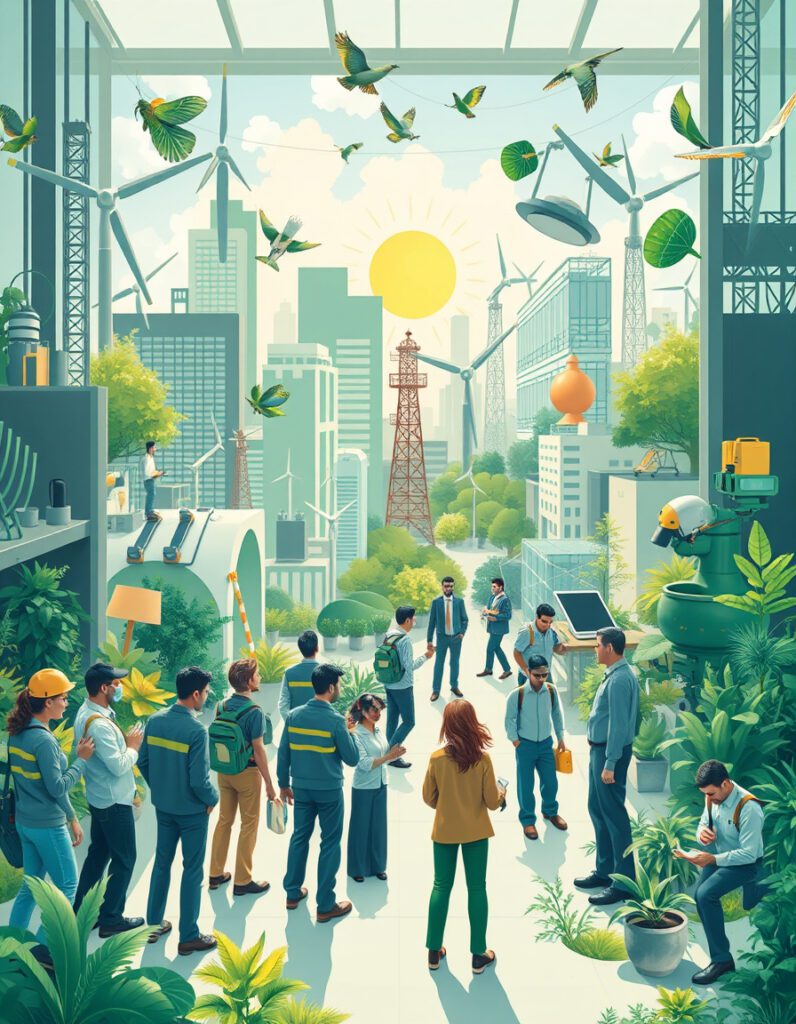The global workforce is undergoing a transformation driven by an urgent need for sustainability. As the world grapples with climate change and environmental degradation, eco-friendly jobs are emerging as a cornerstone of the future economy. This “Green-Collar Revolution” is more than just a trend—it represents a fundamental shift in how industries operate, creating a wealth of job opportunities centered around environmental responsibility. In this article, we explore what green-collar jobs are, why they’re growing in demand, and what the future holds for this vital sector.
What Are Green-Collar Jobs?
Green-collar jobs are roles that directly contribute to environmental sustainability, spanning industries such as renewable energy, clean technology, sustainable agriculture, and environmental conservation. These jobs play a crucial role in reducing carbon footprints, conserving natural resources, and promoting ecological balance. Examples include renewable energy technicians, sustainability consultants, environmental engineers, and organic farming specialists.
As the world transitions toward a greener economy, businesses are not only adapting but are actively seeking ways to integrate sustainable practices into their operations. This shift is creating a surge in demand for workers with expertise in green technologies, environmental policy, and sustainable development.
The Growing Demand for Green-Collar Jobs
According to the World Economic Forum, the need for green collar jobs is rapidly increasing. By 2030, it is projected that over 12 million green jobs will be needed across key industries worldwide. This growth is driven by global efforts to decarbonize economies, adopt renewable energy, and implement sustainable practices,
Industries like construction, manufacturing, and agriculture are seeing significant changes as they pivot towards sustainability. For instance, the demand for environmental engineers and renewable energy specialists is rising as governments enforce stricter environmental regulations and businesses invest in green infrastructure. The shift to sustainable practices is not only vital for combating climate change but also for creating jobs that help build a resilient economy.
Opportunities for Workers in the Green Economy
For job seekers, the green economy presents a wealth of opportunities. Workers in traditional industries are being offered chances to upskill or reskill for green-collar roles. Companies are investing in programs to train their employees in new technologies and sustainable practices, ensuring they remain competitive in the changing market.
For instance, automotive technicians are now required to learn about electric vehicles, while factory workers are being trained in sustainable production techniques. These reskilling efforts not only help workers adapt but also offer long-term career growth and stability in industries that are expected to expand rapidly in the coming decades.
Challenges in the Transition to Green-Collar Jobs
Despite the numerous opportunities, there are challenges in transitioning to a green economy. One of the primary concerns is ensuring that workers have the necessary skills to fill these new roles. Many industries are facing a skills gap, where the demand for green-collar workers exceeds the supply of qualified candidates.
To address this gap, governments and businesses must collaborate on comprehensive strategies that prioritize education, training, and workforce development. This includes creating accessible pathways for workers to enter green-collar fields, such as vocational training programs, apprenticeships, and educational initiatives focused on sustainability and environmental technology.
Another challenge is ensuring that the transition to green-collar jobs is inclusive. Workers in traditional blue-collar roles, particularly those in industries like coal mining or fossil fuel extraction, may feel threatened by the shift towards sustainability. Without adequate support and retraining, these workers risk being left behind in the new economy.
The Future of Green-Collar Jobs
The future of green-collar jobs looks promising. As countries continue to invest in renewable energy, sustainable agriculture, and environmental conservation, the demand for skilled workers in these fields will only grow. It is estimated that the renewable energy sector alone could create millions of new jobs worldwide, providing opportunities for workers in both developed and developing countrie.
Moreover, green-collar jobs are not just about employment—they represent a movement towards a more sustainable and equitable future. By contributing to environmental preservation, workers in these roles are helping to create a world that prioritizes the health of the planet and its inhabitants.
How to Prepare for a Green-Collar Career
If you’re considering a career in the green economy, now is the time to start preparing. Here are a few steps you can take to position yourself for success in the green-collar workforce:
- Gain Relevant Education and Skills: Pursue education in environmental sciences, renewable energy, sustainable agriculture, or related fields. Look for certifications or degrees that align with green-collar industries.
- Stay Informed: Keep up-to-date with industry trends, policy changes, and technological advancements in sustainability. Being knowledgeable about the latest developments can give you a competitive edge.
- Consider Reskilling: If you’re currently in a traditional industry, explore opportunities to reskill for green-collar jobs. Many companies and educational institutions offer training programs that focus on sustainability and environmental responsibility.
- Network: Connect with professionals and organizations in the green economy. Networking can open doors to job opportunities, internships, and mentorships that can help you transition into a green-collar role.

Book a Consultation
If you’re interested in exploring green-collar jobs or need guidance on how to transition into this growing field, we offer personalized consultations to help you navigate your career path. Whether you’re looking to upskill or start fresh in the green economy, our experts can provide you with the insights and resources you need to succeed. Additionally, check out the latest job postings on sponsorshipjobs.org for opportunities in eco-friendly careers that offer visa sponsorship.
FAQs
1. What qualifies as a green-collar job?
A green-collar job is any role that directly contributes to environmental sustainability. This includes jobs in renewable energy, waste management, sustainable agriculture, and environmental conservation.
2. Are green-collar jobs well-paying?
Yes, many green-collar jobs offer competitive salaries, particularly as demand for these roles increases. For example, positions in renewable energy and environmental engineering often offer salaries comparable to traditional engineering jobs.
3. What skills are needed for green-collar jobs?
Skills vary depending on the specific job but often include knowledge of renewable energy technologies, environmental regulations, sustainability practices, and technical expertise in areas like engineering or project management.
4. How do I transition into a green-collar career?
Start by identifying the green-collar field you’re interested in and gaining the necessary skills or certifications. Many industries also offer reskilling programs for workers transitioning from traditional roles to green jobs.
5. Why are green-collar jobs important for the future?
Green-collar jobs are crucial for building a sustainable economy and combating climate change. By focusing on environmental responsibility, these roles help preserve natural resources and ensure a healthier planet for future generations.
Conclusion
The Green-Collar Revolution is redefining the global workforce, offering new opportunities for workers while addressing the urgent need for sustainability. As the demand for eco-friendly jobs grows, it’s essential for both businesses and individuals to embrace this shift. Whether you’re looking to start a green-collar career or transition from a traditional role, the future is bright for those ready to contribute to a more sustainable world.


